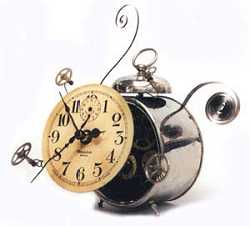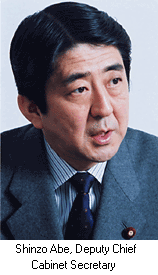
| Now that he's leaving, Reuters finds some nice things to say about Darth Bolton. Skilled, effective, fair. Grrr. |
"He is serious about the American objectives here in reforming the United Nations, and he pushed hard," China's U.N. Ambassador Wang Guangya told reporters. "But of course sometimes in order to achieve the objective you have to work together with others."
"His style is different. He is hard-working," Wang said. "He knows the job."
Bolton also had difficulties with European ambassadors, who should have been his closest allies. But he worked intensively with France on a ceasefire resolution, 1701, to halt the Israeli-Hezbollah war in Lebanon this summer. "I would say we have always respected each other and we were able to work together, especially on 1701," said France's U.N. Ambassador Jean-Marc de la Sabliere
Unable to overcome Democratic opposition in the Senate to his nomination, the White House announced on Monday that Bolton would resign when his temporary appointment expires within weeks. Bolton's recess appointment last year had allowed him to bypass the U.S. Senate confirmation process. Democrats accused him of being a bully and of pressuring subordinates to align their views with his.
| Subordinates are s'posed to support their boss...in this case, POTUS. |
"It is to me really disappointing to see Ambassador Bolton go," said Japan's U.N. Ambassador Kenzo Oshima. "He has been an exceptionally skillful diplomat at the United Nations at a time when it faced very challenging issues like reform."
"In the Security Council John Bolton was spearheading a number of important issues," Oshima said, singling out a resolution to rein in North Korea's nuclear program, where "he really spearheaded this effort to get a Security Council resolution adopted in a very speedy manner."
LESS SUCCESS WITH U.N. GENERAL ASSEMBLY
Several diplomats distinguish between Bolton's work in the 15-nation Security Council and that in the 192-member General Assembly, dominated by developing nations.
"In some ways, he seems to have been more an ambassador to the Security Council than to the United Nations as a whole and I think he has done very well there," said Edward Luck, a Columbia University professor and U.N. expert.
But the problem, Luck said, is his actions in the General Assembly, which is increasingly polarized between developing and developed countries over changes to U.N. management practices, finances and a new human rights body.
"He is very good on preaching on reform but not good at doing it" raising the question of "whether he wants to strengthen it or find excuses for abandoning it," said Luck.
Greece's U.N. Ambassador Adamantios Vassilakis, said the United States was correct in the need for reform but "I might say that I personally would pursue the same thing through different tactics, but that is a different story."
But there was no love lost between the U.N. bureaucracy and Bolton, especially the U.N. Deputy Secretary-General Mark Malloch Brown, a Briton, who said in a June speech that the United States worked closely with the world body in many fields but tolerated "too much unchecked U.N.-bashing and stereotyping." In response Bolton called on Secretary General Kofi Annan to repudiate Malloch Brown "personally and publicly," but Annan stood by the "thrust" of the speech, his spokesman said.

 The European Union, spurred by North Korea's nuclear test, backed limited United Nations sanctions against Iran's nuclear programme on Tuesday after Tehran spurned conditions for opening negotiations. The EU's 25 foreign ministers, meeting in Luxembourg, called for incremental measures that officials said would be targeted first at individuals and materials involved in Iranian uranium enrichment activities. The West suspects Iran is seeking nuclear weapons but Tehran insists it only aims to generate electricity.
The European Union, spurred by North Korea's nuclear test, backed limited United Nations sanctions against Iran's nuclear programme on Tuesday after Tehran spurned conditions for opening negotiations. The EU's 25 foreign ministers, meeting in Luxembourg, called for incremental measures that officials said would be targeted first at individuals and materials involved in Iranian uranium enrichment activities. The West suspects Iran is seeking nuclear weapons but Tehran insists it only aims to generate electricity. Opposition from Lebanon caused the United States and France to delay vote on a UN resolution, diplomats said. The current draft of the Security Council resolution calls for "the immediate cessation by Hezbollah of all attacks and the immediate cessation by Israel of all offensive military operations" %u2013 implicitly giving Israel the right to pursue "defensive" operations. Israel views the draft favourably, as it does not order Israel to withdraw its 10,000 soldiers from southern Lebanon.
Opposition from Lebanon caused the United States and France to delay vote on a UN resolution, diplomats said. The current draft of the Security Council resolution calls for "the immediate cessation by Hezbollah of all attacks and the immediate cessation by Israel of all offensive military operations" %u2013 implicitly giving Israel the right to pursue "defensive" operations. Israel views the draft favourably, as it does not order Israel to withdraw its 10,000 soldiers from southern Lebanon. Japan and the United States have insisted on a UN Security Council resolution that would enact mandatory sanctions on North Korea's missile programme as negotiators sought to prevent a veto from China. Talks at the United Nations in New York have narrowed some differences on the sanctions, which would prevent a transfer of materials or funds for North Korea's missile or nuclear programmes. But other problems remained, diplomats said.
Japan and the United States have insisted on a UN Security Council resolution that would enact mandatory sanctions on North Korea's missile programme as negotiators sought to prevent a veto from China. Talks at the United Nations in New York have narrowed some differences on the sanctions, which would prevent a transfer of materials or funds for North Korea's missile or nuclear programmes. But other problems remained, diplomats said.  Japan remains firmly behind its U.N. Security Council draft resolution to impose sanctions on North Korea, despite France's proposed compromise this week, Chief Cabinet Secretary Shinzo Abe said Wednesday. "As far as Japan is concerned, we basically will seek adoption of the resolution," Abe told reporters.
Japan remains firmly behind its U.N. Security Council draft resolution to impose sanctions on North Korea, despite France's proposed compromise this week, Chief Cabinet Secretary Shinzo Abe said Wednesday. "As far as Japan is concerned, we basically will seek adoption of the resolution," Abe told reporters. ISRAEL claims to have killed nearly 40 Palestinian militants since an offensive was launched in the Gaza Strip last week. Israeli officials said an air strike yesterday killed one Hamas militant and wounded three Palestinians as Israeli troops dug in across a swath of the northern Gaza Strip after a bloody day of fighting with Palestinian gunmen. "What is happening on Palestinian land is a crime against humanity," said the Palestinian Prime Minister,
ISRAEL claims to have killed nearly 40 Palestinian militants since an offensive was launched in the Gaza Strip last week. Israeli officials said an air strike yesterday killed one Hamas militant and wounded three Palestinians as Israeli troops dug in across a swath of the northern Gaza Strip after a bloody day of fighting with Palestinian gunmen. "What is happening on Palestinian land is a crime against humanity," said the Palestinian Prime Minister,  The U.N. Security Council plans to meet in closed session on North Korea's long-anticipated missile testing on Wednesday morning, a French spokesman said. The meeting was requested late on Tuesday by Japan's U.N. ambassador,
The U.N. Security Council plans to meet in closed session on North Korea's long-anticipated missile testing on Wednesday morning, a French spokesman said. The meeting was requested late on Tuesday by Japan's U.N. ambassador,